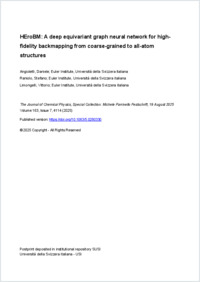HEroBM : a deep equivariant graph neural network for highfidelity backmapping from coarse-grained to all-atom structures
- Angioletti, Daniele ORCID Euler Institute (EUL), Università della Svizzera italiana, Switzerland
- Raniolo, Stefano ORCID Euler Institute (EUL), Università della Svizzera italiana, Switzerland
- Limongelli, Vittorio ORCID Euler Institute (EUL), Università della Svizzera italiana, Switzerland
- 2025
Published in:
- The Journal of Chemical Physics, Special Collection: Michele Parrinello Festschrift. - 2025, vol. 163, no. 7, p. 4114
English
Molecular simulations play a pivotal role in chemistry, biology, and material sciences, enabling the study of complex dynamic properties within systems. Coarse-grained (CG) techniques have emerged as indispensable tools in this domain, facilitating the sampling of large-scale systems and extending simulation timescales by simplifying system representation. However, CG approaches involve a trade-off: they sacrifice atomistic details that may be crucial for understanding the underlying processes. To address this challenge, a recommended strategy is to identify key CG conformations and employ backmapping methods to retrieve atomistic coordinates. Currently, rule-based methods often yield suboptimal geometries and rely on energy relaxation, resulting in less-than-optimal outcomes. In contrast, machine learning techniques offer higher accuracy but may lack transferability between systems or be tied to specific CG mappings. In this study, we present HEroBM, a dynamic and scalable method that utilizes deep equivariant graph neural networks and a hierarchical approach to achieve high-resolution backmapping. HEroBM is capable of handling any type of CG mapping, providing a versatile and efficient protocol for reconstructing atomistic structures with high accuracy. Grounded in local principles, HEroBM spans the entire chemical space and can be applied across systems of varying composition and sizes. We demonstrate the versatility of our framework through a range of biological systems, including a complex real-case scenario. Here, our end-to-end backmapping approach accurately generates atomistic coordinates for a G protein-coupled receptor bound to an organic small molecule within a cholesterol/phospholipid bilayer. The high-fidelity HEroBM backmapping enables researchers to effortlessly transition between CG and all-atom simulations, opening unprecedented avenues for molecular investigations.
- Collections
- Language
-
- English
- Classification
- Computer science and technology
- License
-
Rights reserved
- Open access status
- green
- Identifiers
-
- DOI 10.1063/5.0280330
- ARK ark:/12658/srd1332586
- Persistent URL
- https://n2t.net/ark:/12658/srd1332586
Statistics
Document views: 48
File downloads:
- Limongelli_2025_AIP_Journal of Chemical Physics: 112
